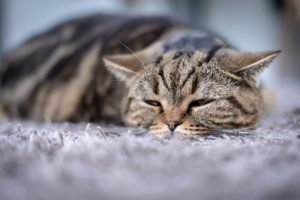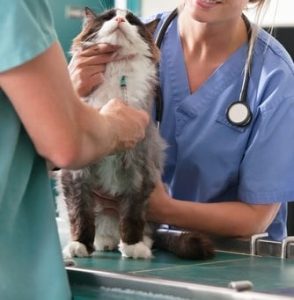Hypothyroidism in cats happens when their body has too little thyroid hormone. It’s very rare unless there’s an underlying trigger or cause. Hypothyroidism in cats usually results from overtreating hyperthyroidism (an overactive thyroid gland).
Primary hypothyroidism (without an underlying trigger) is a lifelong condition. It can be managed with thyroid treatment from a vet. Secondary hypothyroidism is a direct or indirect cause of another illness. Outlook and treatment will depend on the underlying cause.
Overview
Hypothyroidism in cats – what is it?
Hypothyroidism means there’s too little of the thyroid hormone, thyroxine, in your cat’s system. Thyroxine controls the metabolic rate, or how quickly the body burns up energy. It is normally produced in the two small thyroid glands your cat has in their neck.
Thyroid hormone has profound effects on your cat’s metabolism. Think of metabolism as a car’s acceleration. Hypothyroidism means that no matter how hard you press the accelerator pedal, the car is underpowered and slow. For your cat, this means that many body systems that depend on thyroid control stop working properly.
Inside your cat’s body, this slowing down affects important body systems and processes, including:
- Heart
- Brain and nervous system
- Skin
- Control of body temperature and body weight
- Energy levels
- Fighting infections
Early diagnosis of hypothyroidism is challenging because the disease mimics so many other illnesses which also affect one or more of these body systems.
Why does it happen?
Primary hypothyroidism
Primary hypothyroidism in cats happens for one of the following reasons:
- The body’s own defence system mistakenly attacks and destroys the thyroid gland.
- The thyroid gland withers away for no known reason. Vets call this idiopathic atrophy.
- The normal thyroid tissue is replaced by a benign (non-cancerous) growth which does not produce the hormone.
Secondary hypothyroidism
Secondary hypothyroidism results from the following treatments for hyperthyroidism:
- Complete removal of the thyroid gland in a surgical operation.
- Destruction of the thyroid gland with radioactive iodine treatment.
- Getting too much daily thyroid medicine (tablets or gel).
Symptoms
What are the symptoms of hypothyroidism in cats?
Symptoms of hypothyroidism result from reduced energy for body functions.
Common symptoms include:
- Low energy levels and sleeping more
- Being less alert
- Gaining weight without eating any more
- Having dry scaly, flakey skin
- Symmetrical (matching) hair loss from both sides of the body
- Skin infections
- Vomiting and diarrhoea

- Lethargy is a common symptom
Risk
Hypothyroidism in cats – what is the risk?
Primary hypothyroidism is too rare to identify increased risks in particular breeds or lifestyle groups.
Secondary hypothyroidism: cats being treated for hyperthyroidism.
Complications of hypothyroidism
As well as mimicking other illnesses, low thyroid levels can also worsen them, affect response to treatment, or increase your cat’s susceptibility.
This includes:
- Recurrent skin disease and ear infections
- Pancreatitis and triaditis
- Heart disease
- Gastrointestinal problems
- Arthritis
Are my other pets at risk of hypothyroidism?
Where it occurs, hypothyroidism affects individual cats. Your family and other pets are not at risk of catching hypothyroidism.
However, any medicines that affect your cat’s thyroid hormone levels can have the same effect on humans:
- Medicine for hypothyroidism should be handled carefully.
- Wash your hands after handling tablets.
- Clean surfaces thoroughly after contact.
- Keep all medicines out of sight and reach of children and pets.
Diagnosis
How do vets diagnose hypothyroidism in cats?
Hypothyroidism in cats will be easily missed in the early stages. This is because the wide range of symptoms can be vague and common to multiple other illnesses.
Vets diagnose hypothyroidism based on the following:
- The history: any changes you report, like gaining weight, skin changes, low energy.
- Recent history of treatment for hyperthyroidism.
- Physical examination: symmetrical hair loss, scurfy skin, slow heart rate.
- Blood tests: general check and thyroid hormone level.

- Blood tests are part of the diagnosis
Diagnosing primary hypothyroidism isn’t straightforward. Your cat will have more than one blood test before your vet can confirm if they have hypothyroidism. This is because low thyroid levels in the blood can be caused by other factors, including
- Certain medications: including steroids and some antibiotics
- Other illnesses: cats who are unwell for other reasons often have lower than normal thyroid levels. The sicker the patient, the lower their thyroid levels. Vets call this euthyroid sick syndrome.
Your vet won’t want to diagnose hypothyroidism if there could be another explanation for low blood thyroid levels that doesn’t need lifelong treatment.
Overtreatment of hyperthyroidism is more easily assessed with a single blood test. If your treated cat’s thyroid level is too low, their treatment plan is reviewed.
Vet treatment
Vet treatment for hypothyroidism in cats
Treatment for primary hypothyroidism:
Primary hypothyroidism can’t be cured. Controlling the symptoms means replacing the missing thyroid hormone with a man-made alternative.
Your cat’s hypothyroidism treatment includes:
- Having daily medicine by mouth (tablets).
- Attending regular vet checks to make sure they are getting the right dose of their medicine and aren’t getting any side effects.
- Having regular blood tests to check thyroid levels – once or twice per year or after changes in medicine dose.
Symptoms will improve within a very short time. Even hair regrowth is likely within 6 months of starting the right treatment. With the correct treatment, cats with hypothyroidism should return to a full and active life.
Secondary hypothyroidism:
Treatment review, possibly including:
- Reducing daily medication for cats on daily medicine by mouth
- Starting daily thyroid supplementation with man-made thyroxine for cats whose thyroid is inactivated or removed
- Follow-up blood tests to check thyroid levels in response to changes
Home treatment
Caring for a cat with hypothyroidism at home
There are no home remedies for hypothyroidism in cats. Your cat with hypothyroidism needs assessment and medication from a vet.
But home support is essential to ensure your cat gets the most benefit from their treatment:
- Give thyroid and other medicines as prescribed at the correct dose and time.
- Make sure your cat takes their medication.
- Ask for help or alternatives if you are struggling to give tablets.
Prevention
Hypothyroidism in cats – can it be prevented?
Primary hypothyroidism in cats can’t be prevented.
Attending regular check-ups with your vet ensures that hyperthyroidism is well controlled. And reduces the risk of complications relating to too much or too little treatment.
Early diagnosis and treatment of hypothyroidism will help to return your cat to their old selves sooner.
When to worry
Hypothyroidism in cats – when to worry
Hypothyroidism can be associated with other apparently unrelated illnesses.
Call a vet if your cat is:
- Sleepy and unwilling to move
- Gaining or losing weight unexpectedly
- Having seizures or collapsing
- Hard to rouse or cold to touch
Joii can help with:
- Recognising the symptoms of hypothyroidism
- Advice on testing for hypothyroidism
- Suitable diets for cats with weight gain or weight loss
- Tips for giving your cat tablets and other medicines.








